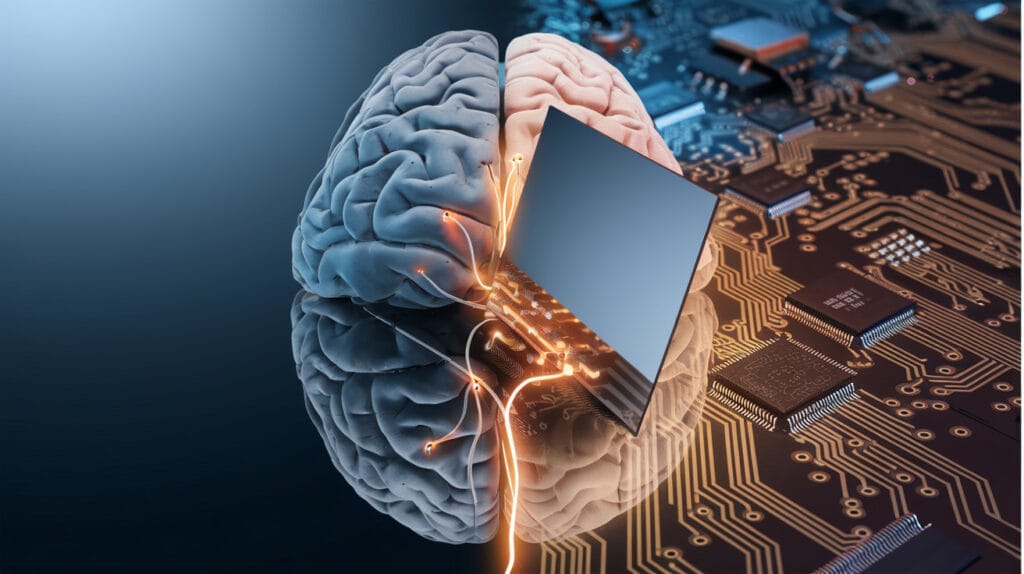Reflections on our biases through AI in mental health.

Discover the convenience of personalized reading. Our table of contents allows you to jump directly to the sections you are most interested in, saving you time and effort. Dive into our articles in an easy and intuitive way!
Have you ever wondered if your own biases might be influencing how you perceive mental health? 🤔 In an era where Artificial Intelligence is revolutionizing healthcare, it’s time to take a closer look at how AI is not just transforming mental health care, but also revealing our own hidden prejudices.
Imagine a world where AI could help us uncover and address the biases we didn’t even know we had. It’s not science fiction—it’s happening right now. As AI systems become more prevalent in mental health diagnostics and treatment, they’re inadvertently holding up a mirror to our own preconceptions and judgments. But here’s the twist: this reflection isn’t always flattering. It’s challenging us to confront uncomfortable truths about how we view mental health issues and those who struggle with them.
In this blog post, we’ll dive deep into the fascinating intersection of AI and mental health. We’ll explore how AI is being used in the field, examine the human biases that often go unnoticed, and discover how AI can help us recognize and address these biases. Along the way, we’ll tackle the ethical considerations and peek into the future of this groundbreaking fusion of technology and psychology. Are you ready to challenge your perceptions and possibly change the way you think about mental health? Let’s begin this eye-opening journey together. 👁️🗨️
Understanding AI in Mental Health

Current applications of AI in mental health
AI is revolutionizing mental health care in various ways. You’ll find AI-powered chatbots providing 24/7 support for individuals experiencing anxiety or depression. These digital companions offer a judgment-free space for you to express your thoughts and feelings. Additionally, AI algorithms analyze speech patterns and facial expressions to detect early signs of mental health issues, potentially allowing for earlier interventions.
Benefits of AI-assisted mental health care
AI-assisted mental health care offers numerous advantages for you as a patient:
- Increased accessibility
- Personalized treatment plans
- Objective data-driven insights
- Continuous monitoring and support
| Benefit | Description |
| Accessibility | 24/7 availability, no geographical limitations |
| Personalization | Tailored interventions based on individual data |
| Objectivity | Unbiased analysis of symptoms and progress |
| Continuity | Ongoing support between therapy sessions |
Potential risks and limitations
While AI in mental health shows promise, you should be aware of its limitations. AI systems may struggle with complex emotional nuances that human therapists can easily detect. There’s also a risk of over-reliance on technology, potentially reducing human interaction in treatment. Privacy concerns arise when AI systems collect and analyze sensitive mental health data.
As you explore AI-assisted mental health options, remember that these tools are meant to complement, not replace, human expertise. The integration of AI in mental health care is an evolving field, and you’ll likely see continued improvements in addressing these challenges as technology advances.
Recognizing Human Biases in Mental Health

Common cognitive biases affecting mental health professionals
Mental health professionals, like all humans, are susceptible to cognitive biases that can influence their judgment and decision-making. Some of the most prevalent biases include:
- Confirmation bias: Seeking information that confirms existing beliefs
- Availability heuristic: Overestimating the likelihood of events based on recent or vivid memories
- Anchoring bias: Relying too heavily on the first piece of information encountered
These biases can significantly impact patient care, leading to misdiagnosis or ineffective treatment plans.
Impact of cultural and societal biases on diagnosis and treatment
Cultural and societal biases play a crucial role in shaping mental health care. These biases can manifest in various ways:
| Bias Type | Example | Potential Impact |
| Racial bias | Overdiagnosis of schizophrenia in Black patients | Inappropriate treatment and stigmatization |
| Gender bias | Underdiagnosis of autism in girls | Delayed interventions and support |
| Age bias | Dismissing depression in older adults as “normal aging” | Untreated mental health issues |
Recognizing these biases is essential for providing equitable and effective mental health care across diverse populations.
The role of personal experiences in shaping biases
Your personal experiences significantly influence your perceptions and judgments. As a mental health professional, your own life events, cultural background, and education can shape your approach to diagnosis and treatment. For example, if you’ve successfully overcome anxiety using a specific therapy, you might be more inclined to recommend that approach to your patients, even when it may not be the most suitable option for their unique circumstances.
Acknowledging the impact of personal experiences on your professional practice is crucial. By being aware of how your background influences your decisions, you can take steps to mitigate potential biases and provide more objective, patient-centered care.
Now that you understand the various biases affecting mental health care, let’s explore how AI can serve as a mirror for these biases, helping us recognize and address them more effectively.
AI as a Mirror for Our Biases

How AI algorithms reflect and amplify human biases
You might be surprised to learn that AI algorithms often act as mirrors, reflecting and magnifying the biases inherent in human decision-making. In mental health, these biases can have significant consequences. When you feed AI systems data that contains human biases, the algorithms learn and perpetuate these prejudices, sometimes even amplifying them.
Case studies of biased AI in mental health applications
Consider these examples of biased AI in mental health:
- Diagnostic Bias: An AI system trained on data predominantly from male patients misdiagnosed depression in women.
- Cultural Bias: A chatbot trained on Western mental health concepts struggled to understand cultural expressions of distress from non-Western users.
- Age Bias: An AI-powered therapy app consistently recommended different treatment approaches for older adults, regardless of their individual needs.
| Bias Type | Example | Potential Impact |
| Gender | Misdiagnosis of depression in women | Inadequate treatment and support |
| Cultural | Misinterpretation of non-Western expressions of distress | Culturally insensitive interventions |
| Age | Stereotypical treatment recommendations for older adults | One-size-fits-all approach ignoring individual needs |
The importance of diverse data sets in AI development
To address these biases, you must recognize the critical role of diverse data sets in AI development. When you include a wide range of perspectives, experiences, and demographics in your training data, you’re more likely to create AI systems that are fair and effective for all users. This approach helps you:
- Reduce bias in diagnoses and treatment recommendations
- Improve cultural sensitivity in mental health applications
- Ensure AI systems can cater to diverse populations
By prioritizing diversity in data collection and AI development, you’re taking a crucial step towards creating more equitable and effective mental health technologies.
Addressing Biases Through AI

AI tools for detecting and mitigating human biases
You can now leverage AI tools to identify and reduce human biases in mental health care. These advanced systems analyze large datasets to detect patterns of bias in diagnoses, treatment recommendations, and patient outcomes. By using AI, you’re able to spot inconsistencies that might escape human notice, ensuring more equitable care for all patients.
Improving mental health diagnoses with AI-assisted decision-making
AI-assisted decision-making tools are revolutionizing how you approach mental health diagnoses. These systems process vast amounts of clinical data, research findings, and patient information to provide evidence-based recommendations. By incorporating AI insights, you can make more accurate and timely diagnoses, reducing the risk of bias-influenced errors.
Enhancing cultural competency in mental health care
AI is playing a crucial role in enhancing cultural competency in mental health care. You can now use AI-powered training programs that simulate diverse patient scenarios, helping you better understand and address the unique needs of patients from various cultural backgrounds. This technology allows you to practice and refine your cultural competency skills in a safe, controlled environment.
Personalizing treatment plans with AI insights
With AI insights, you can create highly personalized treatment plans for your patients. AI algorithms analyze individual patient data, including genetic information, lifestyle factors, and treatment history, to recommend tailored interventions. This personalized approach helps you move beyond one-size-fits-all treatments that may be influenced by unconscious biases.
| AI Application | Benefit |
| Bias Detection Tools | Identify hidden biases in clinical decisions |
| AI-Assisted Diagnosis | Improve accuracy and reduce bias-related errors |
| Cultural Competency Training | Enhance understanding of diverse patient needs |
| Personalized Treatment Planning | Tailor interventions based on individual patient data |
By embracing these AI-driven approaches, you’re taking significant steps towards more equitable, effective, and personalized mental health care. As we continue to refine and expand these technologies, the potential for reducing bias and improving patient outcomes grows exponentially.
Ethical Considerations

Balancing AI assistance with human expertise
As AI becomes more prevalent in mental health, it’s crucial to strike a balance between technological assistance and human expertise. You should view AI as a tool to enhance, not replace, the skills of mental health professionals. By combining AI’s data processing capabilities with your experience and empathy, you can provide more comprehensive care to patients.
Ensuring patient privacy and data security
When using AI in mental health, protecting your patients’ sensitive information is paramount. You must implement robust security measures and adhere to strict privacy regulations. Consider using:
- Encrypted data storage
- Secure communication channels
- Anonymized data for AI training
| Privacy Measure | Description | Importance |
| Data Encryption | Protects patient information from unauthorized access | High |
| Secure Channels | Ensures safe transmission of sensitive data | High |
| Data Anonymization | Removes personal identifiers for AI training | Medium |
Addressing algorithmic bias in AI mental health tools
You need to be aware of potential biases in AI algorithms used in mental health. These biases can lead to unfair or inaccurate assessments, particularly for underrepresented groups. To mitigate this:
- Regularly audit AI systems for bias
- Use diverse datasets for training
- Involve experts from various backgrounds in AI development
Maintaining transparency in AI-assisted decision-making
Transparency is key when using AI in mental health. You should be able to explain how AI-assisted decisions are made to your patients. This includes:
- Clearly communicating the role of AI in their treatment
- Providing insights into how AI recommendations are generated
- Offering options for patients to opt-out of AI-assisted care if desired
By addressing these ethical considerations, you can harness the power of AI in mental health while maintaining trust and integrity in your practice.
The Future of AI and Bias in Mental Health

As we explore the evolving landscape of AI in mental health, it’s crucial to consider the potential advancements that lie ahead. The future holds promising developments in addressing biases and improving mental health care through AI.
Emerging technologies for bias reduction
AI is continuously evolving, and new technologies are emerging to combat biases in mental health treatment. Here are some innovative approaches:
- Federated learning: Allows AI models to learn from diverse datasets without compromising privacy
- Explainable AI (XAI): Enhances transparency in AI decision-making processes
- Adversarial debiasing: Actively removes biased patterns from AI models
| Technology | Purpose | Benefit |
| Federated learning | Diverse data processing | Improved representation |
| Explainable AI | Transparent decision-making | Enhanced trust |
| Adversarial debiasing | Bias removal | Fairer outcomes |
Collaborative efforts between AI developers and mental health professionals
The future of AI in mental health relies heavily on interdisciplinary collaboration. You’ll see increased partnerships between:
- AI researchers and psychologists
- Data scientists and psychiatrists
- Ethicists and healthcare policymakers
These collaborations will lead to more nuanced and effective AI systems that better understand the complexities of mental health.
The potential for AI to create more inclusive mental health care
AI has the power to revolutionize mental health care accessibility and inclusivity. You can expect:
- Personalized treatment plans tailored to diverse cultural backgrounds
- AI-powered language translation for global mental health support
- Adaptive interfaces for individuals with different abilities
The future of AI in mental health is bright, with the potential to create a more equitable and effective system of care for all.
Conclusiones

As you navigate the intersection of AI and mental health, it’s crucial to recognize the profound impact of biases on both human and artificial intelligence. By understanding these biases, you can harness AI’s potential to improve mental health care while remaining vigilant about ethical considerations.
Remember, AI is not just a tool for diagnosis and treatment, but also a mirror reflecting our own biases. By actively addressing these biases through AI, you can contribute to a more equitable and effective mental health care system. As you move forward, stay informed about the evolving landscape of AI in mental health, and always prioritize ethical considerations to ensure that technology serves as a force for positive change in mental health care.


